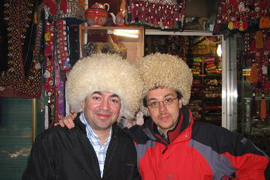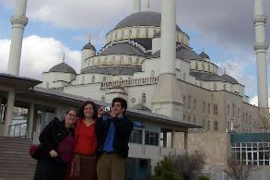Wesleyan Jewish and Muslim Students Explore Faith, Society in Turkey
  |
| At left, Wesleyan Jewish Chaplain Rabbi David Leipziger and Muslim Chaplain Imam Abdulla Antepli try on traditional Turkmenistan hats in an Egyptian Bazaar. At right, Jessica Strom 07, Alana Miller 08 and Jeremy Gillick 07 observe the only mosque in Ankara, Turkey. |
| Posted 05/02/05 |
|
What is life like in a secular Muslim nation, especially for Jews? This was the question that motivated 17 Wesleyan students 12 Jewish, 5 Muslim to go to Istanbul, Turkey, in March during spring break to see for themselves. The eight-day trip, which was envisioned and created by Wesleyans Muslim Chaplain Imam Abdullah Antepli and Wesleyans Jewish Chaplain Rabbi David Leipziger, was discussed at a presentation on April 19 in Judd Hall. Leipziger says the objectives of the inter-religious trip were to study successful Jewish-Muslim coexistence in Istanbul, to interact and build bridges with the Jewish and Muslim communities and to visit major religious and historical sites. Most importantly, we wanted to them to learn about each others backgrounds in order to build strong and vibrant inter-religious programming at Wesleyan, he says. During the discussion, nine of the students took turns discussing their views on the countrys politics, government, social interactions, impressions of the country and interactions between the Wesleyan students. Dan Janvey 06 of New York, N.Y., presented a short documentary on the trip, which included clips of a mosque, prayer, music, and personally delivering a Wesleyan T-shirt to a chief rabbi. Students went on guided tours through Istanbul. Destinations included old Istanbul, a Jewish museum, the Turkish parliament, and a historical home in the Galata area. The students also went to an Egyptian Bazaar, mosques, Faith University, a Turkish music concert, Topkapi Palace, Basilica Cistern, a sufi dance performance, and a Muslim prayer service. The students influential religious and secular leaders in the city, including Chief Rabbi Ishak Halevo and local Jewish leaders, Turkish journalist Ekrem Dumanli local Christian leaders, as well as Vatican representative George Marovitch, and Turkish peace activists and interfaith workers. They also met with U.S. Ambassador Eric Edelman in the U.S. Embassy. But it was during dinners that the students received the most personal interaction with the Turkish people. Every night theyd share a meal at a local residents home, one night with a Muslim family, the next with Jewish hosts. Yaneez Nojib, 08, of Saint-Pierre, Mauritius, said for a few of the Muslim families, this was their first time hosting Jews in their homes. They also allowed the Jews to pray in their living rooms during Sabbath. One night, we ate at this mans home, Nojib says. He was dressed like he was from the O.C. so we thought he was a businessman, but when we sat down for dinner, he didnt have servants to bring us our food. He personally came and brought us out food, and that just shows what wonderful, hospitable, welcoming people they are. If theres one thing I learned, it is that I need to find myself a Turkish wife. The country of Turkey has welcomed Jews, expelled from Spain, and Muslims since 1492. Because Turkey is a secular state and forbids census-takers to include questions of religious affiliations, the exact number of the Jewish population is unknown. By 1477, Jewish households in Istanbul numbered 1,647 or 11 percent of the total, and the present estimation is around 26,000, with the majority living in Istanbul. Although Judiasm has a small presence in Turkey, among nearly 70 million Muslims, Andrew Inchiosa 07 of Woodcliff, N.J. says the Jewish community is evolving with the Turkish culture. During a Shabbat service, one practice seemed especially anomalous to the group. At the mosques, theyd hold out their hands in prayer, but we also observed that at the synagogue, Inchiosa says. It involved a partial, one-handed waving motion. We met an American student studying in Istanbul after the service, and he explained that this was a distinctly Turkish tradition. Inchiosa says there were also few religious divisions from a culinary standpoint. The students were served Turkish tea at many different religious functions, and experienced a version of Turkish delight, featuring milk chocolate, at the home of the ambassador to the Vatican. Other students who went on the trip were Alana Miller 08, Jeremy Gillick 07, Jessica Strom 07, Leora Abelson 07, Saad Mustafa Handoo 06, Marie Brophy 08, Lillian Siegel 08, Nitzan Ziv 07, Jacob Goldin 07, Ben Smyser 08, David Abravanel 08, Emiria Wijayanti 07, Joel Bhuiyan 06 and Nabil Ansari 06. Handoo, of Clarksville, Md., says the students want to reach out to area newspapers, deliver presentations in their hometowns, write articles for Turkish newsletters, hold discussions and conferences about their trip, and reach out to Wesleyan alumni regarding their interfaith experience. Now that we have this knowledge, we want to share it with a broader base and other religious circles, he says. What we have been through has been a transforming experience. Another trip is being planned for March 2006. Anyone interested in ordering a DVD of the students’ documentary, or having the Wesleyan students make a presentation at individual synagogues, mosques, schools or other venues, contact Rabbi Leipziger at 860-685-2278 or dleipziger@wesleyan.edu. |
| By Olivia Drake, The Wesleyan Connection editor |

